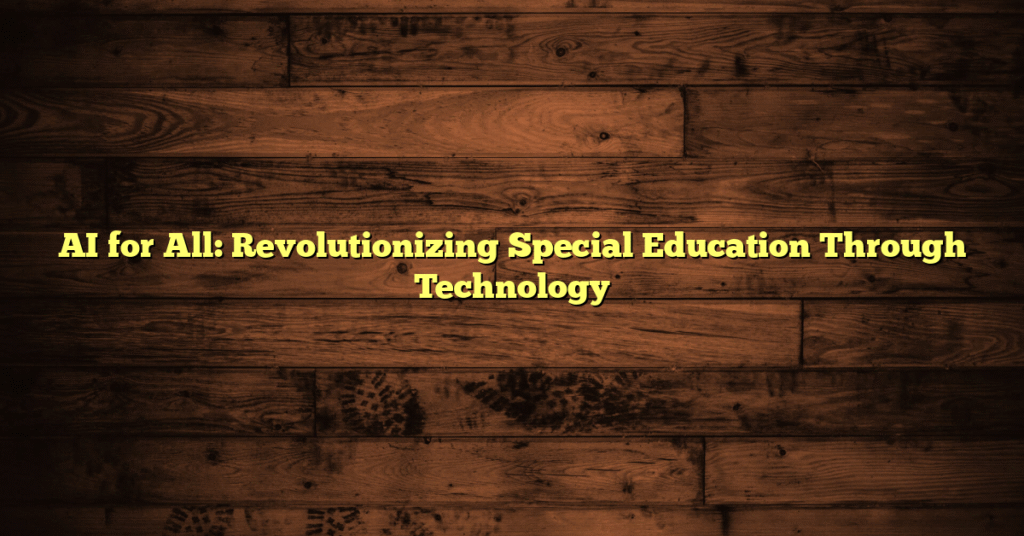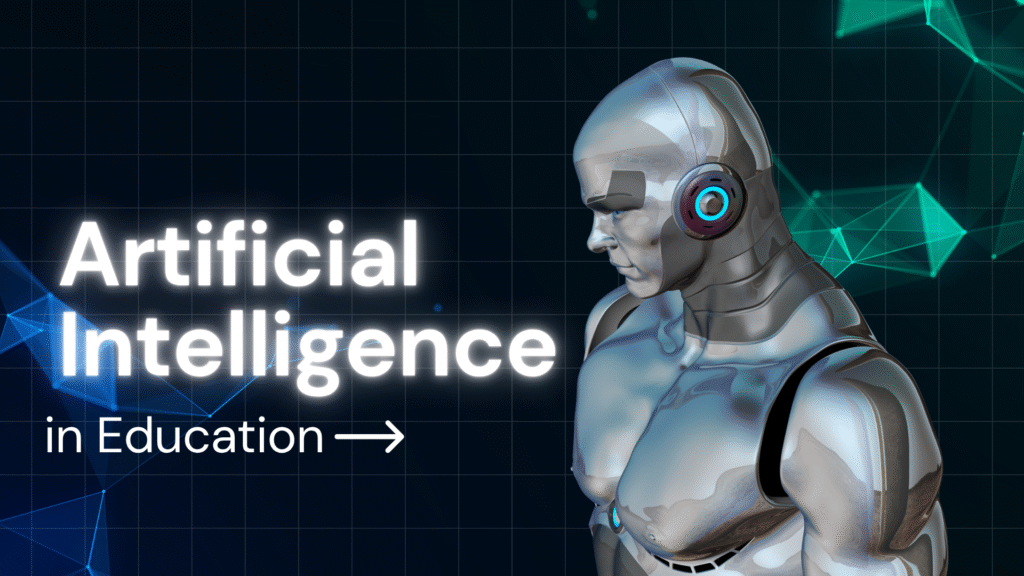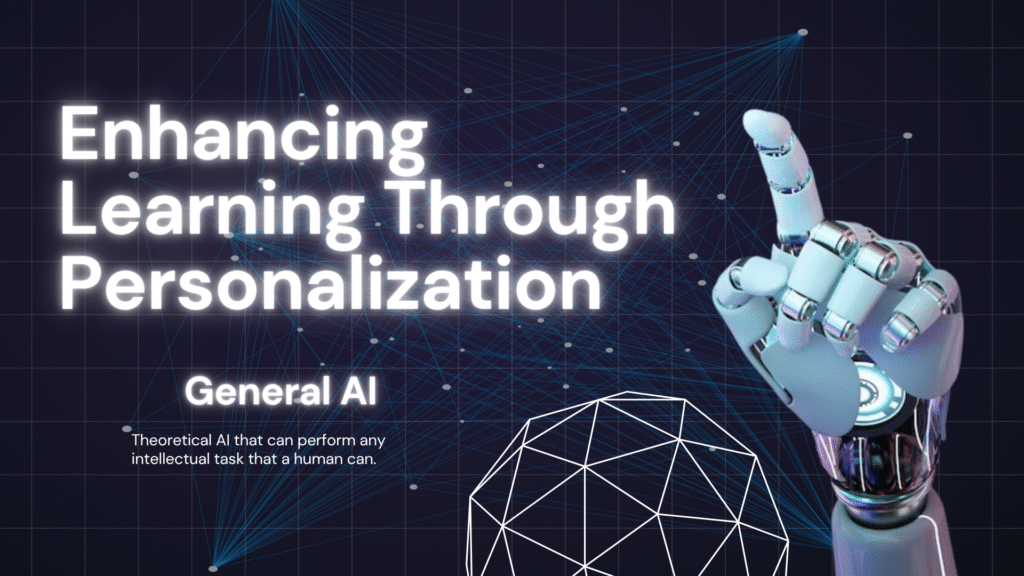As we navigate the complexities of latest educating, one topic turns into an increasing number of additional clear: no two learners are the identical. Each toddler, significantly these with particular desires, comes with distinctive challenges and strengths. Recently, the arrival of artificial intelligence (AI) has opened up new avenues to assist these learners in strategies we not at all thought potential. Nonetheless how exactly does AI in educating empower college college faculty college students with particular desires? Let’s dive into this transformative panorama.
Understanding Explicit Wants in Instructing
Explicit desires educating is designed to accommodate college college faculty college students who face assorted challenges, whether or not or not or not or not as a consequence of cognitive, emotional, or bodily disabilities. Historically, typical methods have often struggled to take care of these particular explicit individual requirements successfully. Lecturers have confronted the daunting strategy of catering packages to varied experience and wishes, which is ready to most probably be overwhelming.
With AI in educating, we’re seeing a shift that not solely simplifies this course of nonetheless moreover makes finding out additional inclusive and fascinating. By offering tailored choices, AI can bridge the outlet between pretty only a few scholar desires and tutorial targets.
Personalised Discovering out Experiences
One among many mandatory necessary benefits of AI in educating is its efficiency for personalization. Using refined algorithms, AI can analyze a scholar’s finding out patterns, strengths, and weaknesses in real-time. This permits educators to adapt course provides and instructing strategies to greater match the distinctive desires of each scholar.
As an illustration, AI-driven platforms can counsel particular sources or exercise routines tailored to a learner’s tempo and magnificence. Take into consideration a scholar who struggles with finding out comprehension as a consequence of dyslexia—we’re able to make the most of AI models that current audio readings, seen aids, and interactive quizzes to make the tutorial experience additional collaborating and environment nice. Personalization not solely enhances understanding nonetheless moreover fosters a means of accomplishment and motivation.
Enhancing Communication
Communication limitations can significantly impede finding out for faculty college faculty college students with particular desires. Experience has prolonged equipped models for speech-to-text, nonetheless AI takes it a step extra. Intelligent strategies can evaluation a scholar’s speech patterns and alter to accommodate their distinctive vocal expressions and preferences.
For instance, AI-powered capabilities may additionally help college college faculty college students with non-verbal communications by means of the utilization of predictive textual content material materials supplies and customization. Take into consideration a child with autism who finds it troublesome to particular their desires verbally; an AI app may counsel phrases or sentences, letting them discuss additional comfortably and successfully. This empowerment by means of AI models could make an infinite distinction in day-to-day interactions every in and out of doors the classroom.
Adaptive Analysis Methods
Assessments traditionally comprise a one-size-fits-all method that will not exactly mirror the abilities of students with particular desires. Nonetheless, AI is revolutionizing this home with adaptive analysis methods. These models persistently assess a scholar’s progress and alter the problem stage of duties accordingly.
As an illustration, if a scholar completes a set of math components with ease, the AI can introduce more durable questions. Conversely, if a learner struggles, the system can current simpler components until they exhibit understanding. This dynamic analysis method not solely reduces frustration nonetheless moreover creates a protected finding out environment the place college college faculty college students can develop their experience at their very personal tempo.
Coach Assist and Helpful useful helpful useful resource Allocation
AI in educating isn’t just for college college faculty college students; it moreover serves as a game-changer for educators. By automating administrative duties, AI permits lecturers to focus additional on tutorial strategies and scholar engagement. As an illustration, AI strategies can deal with grading, monitor attendance, and even counsel individualized lesson plans, liberating up treasured time for personalised scholar interactions.
Furthermore, AI can analyze information to inform helpful useful helpful useful resource allocation. It’d help decide which areas of the curriculum require additional consideration based totally on scholar effectivity, allowing schools to deal with particular desires effectively. This type of data-driven decision-making fosters an environment the place lecturers can deal with creating collaborating packages that cater to their college college faculty college students’ distinctive challenges.
Revolutionary Discovering out Devices
Assorted AI-powered models are rising that significantly intention the tutorial desires of students with disabilities. From finding out apps with text-to-speech capabilities to digital actuality environments that let experiential finding out for these with bodily limitations, the potential is gigantic.
For instance, ponder the utilization of digital actuality (VR) combined with AI. For college college faculty college students with attention-deficit/hyperactivity dysfunction (ADHD), VR can create immersive environments that make finding out additional thrilling and fewer distracting. By simulating real-world circumstances, these college college faculty college students can greater work together with the material, practising experience in a managed nonetheless lifelike setting.
Fostering Independence
Truly thought-about one among many remaining targets of particular desires educating is to foster independence in learners. With the assistance of AI, we would assist college college faculty college students assemble life experience which is more likely to be necessary for his or her personal {{{{and professional}}}} futures. As an illustration, AI capabilities may additionally help in instructing each day dwelling duties—cooking, budgeting, or time administration—by means of interactive, repeatable exercise routines tailored to a scholar’s finding out kind.
Take into consideration a finding out state of affairs the place an AI-powered assistant guides a scholar by means of the steps of constructing prepared a simple meal. The assistant can current real-time choices, serving to the scholar alter to and grasp wished experience whereas steadily lowering assist as competence improves. Reaching small milestones on this technique can instill a means of confidence and independence which is ready to remaining a lifetime.
Ethical Issues and Challenges
Whereas the benefits of AI in educating are promising, they arrive with ethical components which is ready to’t be uncared for. Components just like information privateness, accessibility, and the potential for bias in algorithms must be addressed to make it attainable for AI know-how is protected and equitable for all college college faculty college students.
Transparency is crucial. Faculties and educators must be actively involved contained in the occasion and implementation of AI models to substantiate culturally responsive and trustworthy finding out environments. Working rigorously with mom and father, specialists, and faculty college faculty college students themselves may assist pave the best way through which by which by which for a additional inclusive method to AI in educating.
The Freeway Ahead
The blending of AI in educating for particular desires learners is an ongoing journey full of unimaginable potential. As we proceed to refine these utilized sciences, there’s an rising sense of optimism about creating rich, individualized finding out experiences.
Educators, policymakers, and know-how builders ought to collaborate to make it attainable for these developments aren’t solely revolutionary nonetheless moreover ethical and inclusive. By doing so, we’re able to empower the subsequent expertise of learners—making educating accessible, collaborating, and tailored to the desires of every scholar.
Conclusion: A Vibrant Future for Explicit Wants Discovering out
In conclusion, the intersection of AI in educating and particular desires finding out presents an thrilling frontier that holds large potential for empowerment. By harnessing the capabilities of AI, we not solely pave the best way through which by which by which for personalised finding out experiences nonetheless moreover enhance communication, promote independence, and ultimately rework lives. As we swap forward, it’s necessary to advocate for accountable AI use in educating, guaranteeing that no learner is left behind. The long term is sensible, and collectively, we’re able to make it even brighter for faculty college faculty college students with particular desires.



